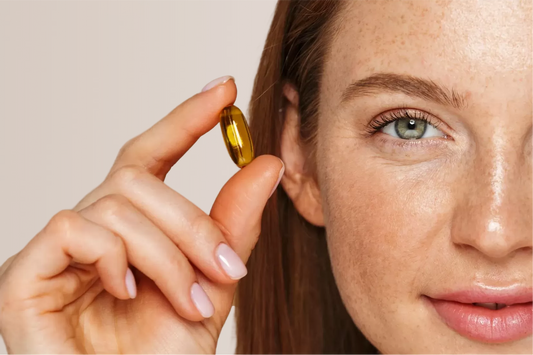Best vitamin A rich foods
Best vitamin A rich foods
Vitamin A is one of the most powerful nutrients in our journey to achieve perfect health. Among all the vitamins, vitamin A is a fat-soluble vitamin that is very essential for good vision, healthy immune function, and good skin. In this blog, we will explore the best vitamin A-rich foods that you can easily incorporate into your diet.
What is Vitamin A?
Vitamin A is a fat-soluble vitamin that exists in two major forms: preformed vitamin A (retinol), supplied primarily by animal products, and provitamin A carotenoids, supplied primarily by plant-based foods. This nutrient plays a major role in maintaining your body's health by supporting vision, immune function, reproduction, and cellular communication. It is also crucial for healthy skin, the proper functioning of organs such as the heart and lungs, and the development of the fetus during pregnancy.
Vitamin A is necessary for your body to synthesize rhodopsin, the pigment in your eye's retina that allows you to see in the dark. Vitamin A also helps maintain the healthy linings of your organs. Too little vitamin A leads to problems like night blindness and impaired immune systems, but too much is just as bad.
Benefits of Vitamin A
Vitamin A provides many health benefits, including the following:
- Eye Health: It is essential for good vision and also prevents night blindness. Vitamin A might also decrease the risk of AMD because of its ability to protect the retina against oxidative damage.
- Immune Function: This vitamin enhances the immune system through the activation of T cells and B cells, which are very vital in the fight against infections. It also helps protect the mucous membranes lining the respiratory and digestive tracts.
- Reproductive Health: Vitamin A supports sperm production in men and plays a critical role in fetal development during pregnancy.
- Skin Health: It promotes the proliferation and repair of skin cells, hence important for healthy-looking skin and preventing dryness of the skin.
- Antioxidant Properties: The carotenoids in vitamin A exert antioxidant effects that help neutralize free radicals, which may reduce the risk of chronic diseases such as cancer and heart disease.
Best Vitamin A Rich Foods
To ensure adequate intake of vitamin A, it's essential to incorporate a variety of foods into your diet. Here are some of the best sources:
Animal Foods High in Vitamin A
| Food Source | Vitamin A Content (per serving) |
|---|---|
| Beef liver, cooked | 17,800 mcg RAE |
| Lamb liver, cooked | 6,615 mcg RAE |
| Liver sausage (liverwurst) | 2,250 mcg RAE |
| Cod liver oil | 4,080 mcg RAE |
| King mackerel, cooked | 643 mcg RAE |
| Salmon, cooked | 1,000 mcg RAE |
| Bluefin tuna, cooked | 643 mcg RAE |
| Goose liver pâté, canned | 2,000 mcg RAE |
| Goat cheese | 82 mcg RAE |
| Butter | 97 mcg RAE |
| Limburger cheese | 148 mcg RAE |
| Cheddar cheese | 201 mcg RAE |
| Camembert cheese | 300 mcg RAE |
| Roquefort cheese | 200 mcg RAE |
| Eggs | 98 mcg RAE |
| Trout, cooked | 500 mcg RAE |
| Clams, canned | 1,200 mcg RAE |
| Cream cheese | 100 mcg RAE |
| Oysters, canned | 77 mcg RAE |
| Whole milk | 112 mcg RAE |
Vegetables High in Vitamin A
| Food Source | Vitamin A Content (per serving) |
|---|---|
| Sweet potato, baked | 1,190 mcg RAE |
| Butternut squash, baked | 1,140 mcg RAE |
| Kale, cooked | 943 mcg RAE |
| Collard greens, cooked | 630 mcg RAE |
| Turnip greens, cooked | 700 mcg RAE |
| Carrots, cooked | 1,329 mcg RAE |
| Sweet red pepper, raw | 250 mcg RAE |
| Swiss chard, cooked | 400 mcg RAE |
| Spinach, cooked | 943 mcg RAE |
| Romaine lettuce, raw | 133 mcg RAE |
Fruits High in Vitamin A
| Food Source | Vitamin A Content (per serving) |
|---|---|
| Mango | 89 mcg RAE |
| Cantaloupe | 270 mcg RAE |
| Grapefruit | 50 mcg RAE |
| Watermelon | 28 mcg RAE |
| Papaya | 108 mcg RAE |
| Apricot | 96 mcg RAE |
| Tangerine | 66 mcg RAE |
| Nectarine | 70 mcg RAE |
| Guava | 80 mcg RAE |
| Passion fruit | 20 mcg RAE |
Recommended Intake of Vitamin A
How much vitamin A you need depends on your age and gender. For adults, the recommended daily amount is:
- 900 micrograms (mcg) for men
- 700 micrograms (mcg) for women
It’s important to get enough vitamin A without overdoing it. The upper limit for adults is set at 3,000 mcg per day—going over this regularly could lead to health issues.
Conclusion
Adding a variety of foods rich in vitamin A to your diet is one way of maintaining good health. Foods rich in this nutrient include both animal products, such as liver and fish, and vegetables, such as sweet potatoes and leafy greens. These enable the body to have good vision, immunity, and skin, among other things. When you eat a balanced diet that includes these sources, you can get adequate amounts of vitamin A and enjoy many benefits.
FAQs
What are the symptoms of vitamin A deficiency?
Some symptoms of deficiency include night blindness, dry skin or eyes, infections frequently, and slow healing of wounds.
Can I get too much vitamin A?
Yes, it's possible to have too much. Symptoms of vitamin A toxicity include nausea, headaches, dizziness, and even liver damage in extreme cases.
Are supplements necessary?
With a proper diet, most people's needs for vitamin A will be met. However, supplements can be helpful should their diets be very limited for any reason or if it is not being adequately absorbed through foods.



